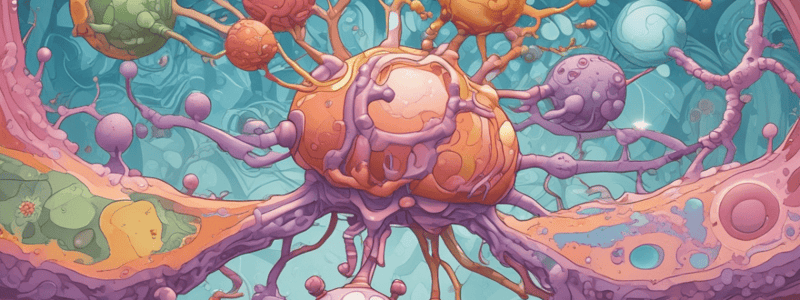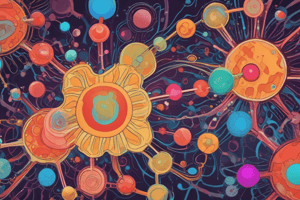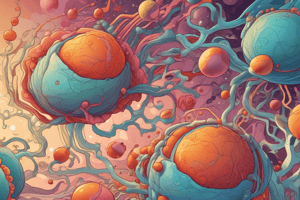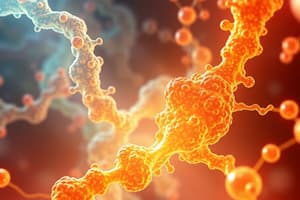Podcast
Questions and Answers
What is the primary function of NAD/NADH and NADP/NADH in energy metabolism?
What is the primary function of NAD/NADH and NADP/NADH in energy metabolism?
- To act as energy carriers and donate electrons (correct)
- To regulate gene expression
- To catalyze enzyme reactions
- To store energy in the form of ATP
What is the term for the controlled release of energy in enzyme-catalyzed metabolic pathways?
What is the term for the controlled release of energy in enzyme-catalyzed metabolic pathways?
- Catabolism
- Energy conservation (correct)
- Feedback inhibition
- Anabolism
What is the primary function of Coenzyme A/acetyl CoA in energy metabolism?
What is the primary function of Coenzyme A/acetyl CoA in energy metabolism?
- To regulate gene expression
- To carry acetyl groups in citric acid cycle (correct)
- To donate electrons in redox reactions
- To synthesize ATP during oxidative phosphorylation
What is the role of NADP in metabolic reactions?
What is the role of NADP in metabolic reactions?
What is the term for the process of building molecules, requiring energy, in metabolic pathways?
What is the term for the process of building molecules, requiring energy, in metabolic pathways?
What is the function of flavins in metabolic reactions?
What is the function of flavins in metabolic reactions?
What is the primary function of ATP in energy metabolism?
What is the primary function of ATP in energy metabolism?
What is the role of Acetyl-CoA in metabolic reactions?
What is the role of Acetyl-CoA in metabolic reactions?
Where are the metabolic pathways, including glycolysis, TCA cycle, β-oxidation, and oxidative phosphorylation, primarily localized in eukaryotic cells?
Where are the metabolic pathways, including glycolysis, TCA cycle, β-oxidation, and oxidative phosphorylation, primarily localized in eukaryotic cells?
What is the structure of Coenzyme A (CoA)?
What is the structure of Coenzyme A (CoA)?
What is the result of NAD+ reduction?
What is the result of NAD+ reduction?
What is the role of FAD in metabolic reactions?
What is the role of FAD in metabolic reactions?
What is the primary function of the metabolic breakdown of complex substances into smaller products?
What is the primary function of the metabolic breakdown of complex substances into smaller products?
Which of the following is a characteristic of anabolism?
Which of the following is a characteristic of anabolism?
What is the term for the totality of the chemical reactions and physical changes that occur in living organisms?
What is the term for the totality of the chemical reactions and physical changes that occur in living organisms?
In which part of the mitochondria would you find the enzymes involved in the synthesis, breakdown, and interconversion of essential biomolecules?
In which part of the mitochondria would you find the enzymes involved in the synthesis, breakdown, and interconversion of essential biomolecules?
What is the result of the catabolic breakdown of carbon compounds?
What is the result of the catabolic breakdown of carbon compounds?
What is the primary difference between anabolism and catabolism?
What is the primary difference between anabolism and catabolism?
Which of the following is NOT a characteristic of catabolism?
Which of the following is NOT a characteristic of catabolism?
What is the name of the space between the inner and outer mitochondrial membranes?
What is the name of the space between the inner and outer mitochondrial membranes?
What is the process called when an amino acid is converted into another amino acid?
What is the process called when an amino acid is converted into another amino acid?
Which amino acid undergoes a meaningful level of deamination in humans?
Which amino acid undergoes a meaningful level of deamination in humans?
What is the byproduct of deamination of glutamate?
What is the byproduct of deamination of glutamate?
What is the role of glutamine in the body?
What is the role of glutamine in the body?
Where does the deamination of glutamate take place?
Where does the deamination of glutamate take place?
What is the outcome of glutamine formation from glutamate?
What is the outcome of glutamine formation from glutamate?
What happens to glutamate in the liver?
What happens to glutamate in the liver?
What is the fate of NH4+ molecules in the liver?
What is the fate of NH4+ molecules in the liver?
In the electron transport chain, what is the final electron acceptor?
In the electron transport chain, what is the final electron acceptor?
What is the purpose of the electron transport chain in the mitochondria?
What is the purpose of the electron transport chain in the mitochondria?
What is the result of proton flow through the ATP synthase protein complex?
What is the result of proton flow through the ATP synthase protein complex?
What happens to the carbon skeleton of amino acids that are surplus to requirements?
What happens to the carbon skeleton of amino acids that are surplus to requirements?
What is the purpose of the electron transport chain in terms of ATP production?
What is the purpose of the electron transport chain in terms of ATP production?
What is the location of the electron transport chain in the mitochondria?
What is the location of the electron transport chain in the mitochondria?
What is the result of the oxidation of NADH and FADH2 in the electron transport chain?
What is the result of the oxidation of NADH and FADH2 in the electron transport chain?
What is the term for the process by which the N from the α‑amino group is removed from amino acids?
What is the term for the process by which the N from the α‑amino group is removed from amino acids?
Flashcards are hidden until you start studying
Study Notes
Introduction to Metabolism
- Metabolism is the totality of chemical reactions and physical changes that occur in living organisms, comprising anabolism and catabolism.
- Enzyme reactions involve synthesis, breakdown, and interconversion of essential biomolecules.
Catabolism and Anabolism
- Catabolism: the metabolic breakdown of complex substances into smaller products, including the breakdown of carbon compounds with the liberation of energy for use by the cell or organism.
- Anabolism: the energy-requiring part of metabolism in which simpler substances are transformed into more complex ones, as in growth or other biosynthetic processes.
Electron Carriers and Activated Carrier Molecules
- NAD+ and NADH: electron carriers involved in oxidation and reduction reactions.
- NADP+ replaces NAD+ in anabolic reactions, such as lipid synthesis.
- Flavin adenine dinucleotide (FAD) and FADH2: electron carriers involved in oxidation and reduction reactions.
- Acetyl-CoA: a carrier of an acyl group (2 carbons), not electrons or hydrogens.
Electron Transport Chain
- The electron transport chain is a series of protein complexes embedded in the inner mitochondrial membrane.
- Electrons are transported along the chain, finally reducing O2 to form H2O.
- The energy released is used to pump protons (H+) into the intermembrane space, creating an electrochemical gradient.
- Protons flow back through the membrane via ATP Synthase, driving the synthesis of ATP from ADP + Pi.
Amino Acid Metabolism
- Amino acid metabolism is also known as 'nitrogen metabolism'.
- Amino acids that are surplus to requirements are not stored, instead, the N from the α-amino group is removed and the remaining carbon skeleton is further metabolized.
- Deamination: removal of N from amino acids, occurs in the liver.
- Transamination: conversion of one amino acid to another, occurs in most tissues.
- Glutamine carries 2 nitrogen atoms and is a safe carrier of 2 N to the liver for deamination.
- Glutamate is reformed from glutamine in the liver, then deaminated to α-ketoglutarate, releasing NH4+.
Studying That Suits You
Use AI to generate personalized quizzes and flashcards to suit your learning preferences.





